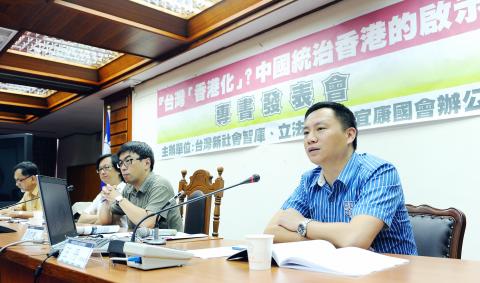Taiwan has paid too little attention to the civil movement in Hong Kong and could be the next in line to be absorbed by Beijing if the trend continues, politicians and political observers said at a panel discussion in Taipei yesterday.
Hong Kong, which was handed back to China by the UK in 1997, could serve as a perfect example for Taiwan in its efforts to defy Chinese political pressure and influence, said Wang Dan (王丹), a Chinese dissident who now teaches at National Tsinghua University in Hsinchu.
Wang was one of the guest speakers at a panel discussion on the theme of “Taiwan’s Hong Kong-ization,” which is also the theme of a book published by New Society for Taiwan, a think tank and co-organizer of the event.

Photo: Chang Chia-ming, Taipei Times
Democratic Progressive Party (DPP) Legislator Tuan Yi-kang (段宜康), the other co-organizer, moderated the discussion.
Taiwan has already been “Hong Kong-ized,” Wang said, because government agencies, institutions and media outlets have all learned to “self-discipline” themselves in what can and cannot be done in much the same fashion as their Hong Kong counterparts prior to the 1997 handover.
Second, as with Hong Kong, China has used its economic power to influence Taiwanese politics, Wang said.
Wang agreed with the idea of advocating a “cross-strait alliance of civil movements” between people in China, Hong Kong and Taiwan, saying that it could be the only effective way to stop Taiwan from “Hong Kong-ization.”
Wang predicted that the increasing political participation of those born after 1990 would play a critical role in Hong Kong’s civil movement in the future because this young generation is now “even more anti-communist than their parents and more active in speaking their minds and participating in politics.”
Emily Lau (劉慧卿), a member of the Legislative Council of Hong Kong and vice president of the Hong Kong Democratic Party, said via video teleconference that China had not won the hearts of people in Hong Kong even 15 years after the handover.
The “one country, two systems” mechanism was originally designed by Beijing for Taiwan, but it was implemented in Hong Kong first, Lau said, adding that the results and process of the implementation could serve as a reference for Taiwan.
Chang Tieh-chih (張鐵志), a political commentator, said China has been getting impatient with the civil movement in Hong Kong in recent years, but everything it did “pushed Hong Kong people further from China.”
Hong Kong paid little attention to Taiwan in the past, former DPP legislator Lin Chuo-shui (林濁水) said, even though both have walked similar historical paths — both were ceded by China after wars and both advanced economically before China.
However, both sides appeared to “connect” to each other after the 1997 handover as people in Hong Kong looked to Taiwan as a political inspiration and model.
In a recent poll, Taiwan ranked as the favorite foreign nation among Hong Kong residents, he said, adding that “a democratic Taiwan out of China’s control would be a pillar for Hong Kong’s democratic movement.”

Alain Robert, known as the "French Spider-Man," praised Alex Honnold as exceptionally well-prepared after the US climber completed a free solo ascent of Taipei 101 yesterday. Robert said Honnold's ascent of the 508m-tall skyscraper in just more than one-and-a-half hours without using safety ropes or equipment was a remarkable achievement. "This is my life," he said in an interview conducted in French, adding that he liked the feeling of being "on the edge of danger." The 63-year-old Frenchman climbed Taipei 101 using ropes in December 2004, taking about four hours to reach the top. On a one-to-10 scale of difficulty, Robert said Taipei 101

Taiwanese and US defense groups are collaborating to introduce deployable, semi-autonomous manufacturing systems for drones and components in a boost to the nation’s supply chain resilience. Taiwan’s G-Tech Optroelectronics Corp subsidiary GTOC and the US’ Aerkomm Inc on Friday announced an agreement with fellow US-based Firestorm Lab to adopt the latter’s xCell, a technology featuring 3D printers fitted in 6.1m container units. The systems enable aerial platforms and parts to be produced in high volumes from dispersed nodes capable of rapid redeployment, to minimize the risk of enemy strikes and to meet field requirements, they said. Firestorm chief technology officer Ian Muceus said

MORE FALL: An investigation into one of Xi’s key cronies, part of a broader ‘anti-corruption’ drive, indicates that he might have a deep distrust in the military, an expert said China’s latest military purge underscores systemic risks in its shift from collective leadership to sole rule under Chinese President Xi Jinping (習近平), and could disrupt its chain of command and military capabilities, a national security official said yesterday. If decisionmaking within the Chinese Communist Party has become “irrational” under one-man rule, the Taiwan Strait and the regional situation must be approached with extreme caution, given unforeseen risks, they added. The anonymous official made the remarks as China’s Central Military Commission Vice Chairman Zhang Youxia (張又俠) and Joint Staff Department Chief of Staff Liu Zhenli (劉振立) were reportedly being investigated for suspected “serious

Nipah virus infection is to be officially listed as a category 5 notifiable infectious disease in Taiwan in March, while clinical treatment guidelines are being formulated, the Centers for Disease Control (CDC) said yesterday. With Nipah infections being reported in other countries and considering its relatively high fatality rate, the centers on Jan. 16 announced that it would be listed as a notifiable infectious disease to bolster the nation’s systematic early warning system and increase public awareness, the CDC said. Bangladesh reported four fatal cases last year in separate districts, with three linked to raw date palm sap consumption, CDC Epidemic Intelligence